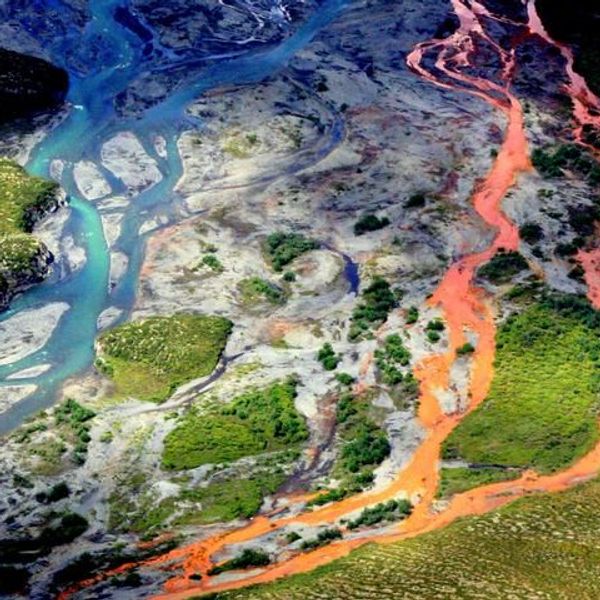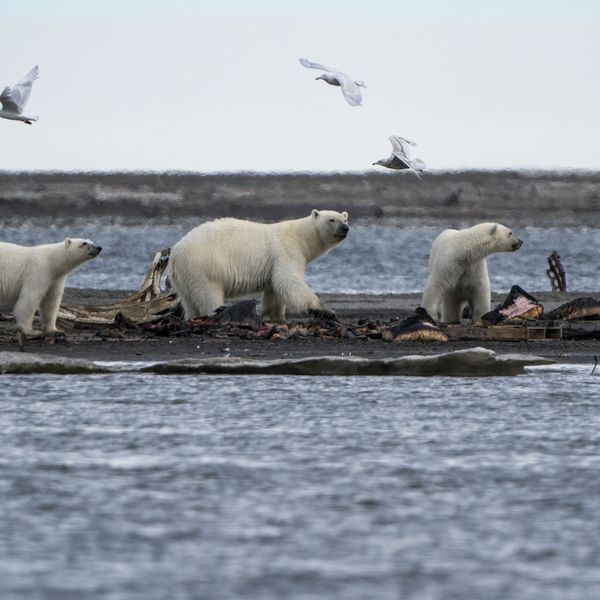Obama Announces New Plan to Save Arctic: More Icebreakers!
During his controversial Alaska visit, the US president continues his trend of lofty, climate change speeches coupled with more support for Arctic drilling
Faced with ever-increasing global temperatures and rapidly melting Arctic ice, what might the next logical step be for U.S. President Barack Obama? To call for an end to Arctic drilling?
No! More icebreakers!
On the second day of his controversial three-day visit to Alaska on Tuesday, Obama declared that in order to stay competitive with Russia amid a frosty new resource grab, the U.S. must speed up its investment in a heavy icebreaker.
The U.S. currently owns seven icebreakers, though only two are functional. In comparison, Russia owns 40, with an additional 11 planned or under construction. Obama said that he will call on Congress to procure another $1 billion vessel for the Coast Guard by 2020, two years ahead of schedule.
Such polar icebreakers are specifically designed cutters for open-water icebreaking. As the ice sheet melts and new shipping routes open up, there will be a dramatic increase in the amount of human activity and commerce on the Arctic Ocean. Further, the latest U.S. push to drill for oil in the Arctic is also driving industry to the barren and fragile landscape.
"Arctic ecosystems are among the most pristine and understudied in the world, meaning increased commercial activity comes with significant risks to the environment," the White House said in a statement.
"The growth of human activity in the Arctic region will require highly engaged stewardship to maintain the open seas necessary for global commerce and scientific research, allow for search-and-rescue activities, and provide for regional peace and stability," the statement continued.
The move was applauded by Alaska's Republican Senators, Lisa Murkowski and Dan Sullivan.
"The highways of the Arctic are paved by icebreakers," Sullivan said. "Right now, the Russians have superhighways, and we have dirt roads with potholes."
And Murkowski noted that icebreakers are just one type of vessel necessary to support Arctic drilling operations, which officially began last month.
"We need the assets to ensure we can safely operate in the Arctic," Murkowski said. "That means icebreakers, aircraft and oil spill response infrastructure."
Ever since the president's Alaska trip was first announced, environmentalists and other critics of Arctic drilling have been mystified by the disconnect between Obama's lofty, climate-change rhetoric and his approval of Shell's drilling plans.
In a stirring speech delivered at the GLACIER conference on Tuesday, Obama spoke of "a challenge that will define the contours of this century more dramatically than any other...the urgent and growing threat of a changing climate."
Afterwards, Bill McKibben, founder of the international environmental movement 350.org remarked:
\u201cIt's literally painful to hear Obama's powerful words from Alaska and know that they're so cheapened by his decision to let Shell drill\u201d— Bill McKibben (@Bill McKibben) 1441110188
During the trip, the president also announced a new joint initiative by the National Oceanic and Atmospheric Administration (NOAA) and the Coast Guard to map and chart the newly accessible Bering, Chukchi and Beaufort Seas. NOAA will also be installing new equipment to monitor the effects of climate change, including sea-level rise and sea-ice thickness, he said.
And on Wednesday, Obama is expected to introduce a series of initiatives including new resilience and relocation plans for Alaskan people, whom he says are living "on the leading edge of climate change."
An Urgent Message From Our Co-Founder
Dear Common Dreams reader, The U.S. is on a fast track to authoritarianism like nothing I've ever seen. Meanwhile, corporate news outlets are utterly capitulating to Trump, twisting their coverage to avoid drawing his ire while lining up to stuff cash in his pockets. That's why I believe that Common Dreams is doing the best and most consequential reporting that we've ever done. Our small but mighty team is a progressive reporting powerhouse, covering the news every day that the corporate media never will. Our mission has always been simple: To inform. To inspire. And to ignite change for the common good. Now here's the key piece that I want all our readers to understand: None of this would be possible without your financial support. That's not just some fundraising cliche. It's the absolute and literal truth. We don't accept corporate advertising and never will. We don't have a paywall because we don't think people should be blocked from critical news based on their ability to pay. Everything we do is funded by the donations of readers like you. Will you donate now to help power the nonprofit, independent reporting of Common Dreams? Thank you for being a vital member of our community. Together, we can keep independent journalism alive when it’s needed most. - Craig Brown, Co-founder |
Faced with ever-increasing global temperatures and rapidly melting Arctic ice, what might the next logical step be for U.S. President Barack Obama? To call for an end to Arctic drilling?
No! More icebreakers!
On the second day of his controversial three-day visit to Alaska on Tuesday, Obama declared that in order to stay competitive with Russia amid a frosty new resource grab, the U.S. must speed up its investment in a heavy icebreaker.
The U.S. currently owns seven icebreakers, though only two are functional. In comparison, Russia owns 40, with an additional 11 planned or under construction. Obama said that he will call on Congress to procure another $1 billion vessel for the Coast Guard by 2020, two years ahead of schedule.
Such polar icebreakers are specifically designed cutters for open-water icebreaking. As the ice sheet melts and new shipping routes open up, there will be a dramatic increase in the amount of human activity and commerce on the Arctic Ocean. Further, the latest U.S. push to drill for oil in the Arctic is also driving industry to the barren and fragile landscape.
"Arctic ecosystems are among the most pristine and understudied in the world, meaning increased commercial activity comes with significant risks to the environment," the White House said in a statement.
"The growth of human activity in the Arctic region will require highly engaged stewardship to maintain the open seas necessary for global commerce and scientific research, allow for search-and-rescue activities, and provide for regional peace and stability," the statement continued.
The move was applauded by Alaska's Republican Senators, Lisa Murkowski and Dan Sullivan.
"The highways of the Arctic are paved by icebreakers," Sullivan said. "Right now, the Russians have superhighways, and we have dirt roads with potholes."
And Murkowski noted that icebreakers are just one type of vessel necessary to support Arctic drilling operations, which officially began last month.
"We need the assets to ensure we can safely operate in the Arctic," Murkowski said. "That means icebreakers, aircraft and oil spill response infrastructure."
Ever since the president's Alaska trip was first announced, environmentalists and other critics of Arctic drilling have been mystified by the disconnect between Obama's lofty, climate-change rhetoric and his approval of Shell's drilling plans.
In a stirring speech delivered at the GLACIER conference on Tuesday, Obama spoke of "a challenge that will define the contours of this century more dramatically than any other...the urgent and growing threat of a changing climate."
Afterwards, Bill McKibben, founder of the international environmental movement 350.org remarked:
\u201cIt's literally painful to hear Obama's powerful words from Alaska and know that they're so cheapened by his decision to let Shell drill\u201d— Bill McKibben (@Bill McKibben) 1441110188
During the trip, the president also announced a new joint initiative by the National Oceanic and Atmospheric Administration (NOAA) and the Coast Guard to map and chart the newly accessible Bering, Chukchi and Beaufort Seas. NOAA will also be installing new equipment to monitor the effects of climate change, including sea-level rise and sea-ice thickness, he said.
And on Wednesday, Obama is expected to introduce a series of initiatives including new resilience and relocation plans for Alaskan people, whom he says are living "on the leading edge of climate change."
Faced with ever-increasing global temperatures and rapidly melting Arctic ice, what might the next logical step be for U.S. President Barack Obama? To call for an end to Arctic drilling?
No! More icebreakers!
On the second day of his controversial three-day visit to Alaska on Tuesday, Obama declared that in order to stay competitive with Russia amid a frosty new resource grab, the U.S. must speed up its investment in a heavy icebreaker.
The U.S. currently owns seven icebreakers, though only two are functional. In comparison, Russia owns 40, with an additional 11 planned or under construction. Obama said that he will call on Congress to procure another $1 billion vessel for the Coast Guard by 2020, two years ahead of schedule.
Such polar icebreakers are specifically designed cutters for open-water icebreaking. As the ice sheet melts and new shipping routes open up, there will be a dramatic increase in the amount of human activity and commerce on the Arctic Ocean. Further, the latest U.S. push to drill for oil in the Arctic is also driving industry to the barren and fragile landscape.
"Arctic ecosystems are among the most pristine and understudied in the world, meaning increased commercial activity comes with significant risks to the environment," the White House said in a statement.
"The growth of human activity in the Arctic region will require highly engaged stewardship to maintain the open seas necessary for global commerce and scientific research, allow for search-and-rescue activities, and provide for regional peace and stability," the statement continued.
The move was applauded by Alaska's Republican Senators, Lisa Murkowski and Dan Sullivan.
"The highways of the Arctic are paved by icebreakers," Sullivan said. "Right now, the Russians have superhighways, and we have dirt roads with potholes."
And Murkowski noted that icebreakers are just one type of vessel necessary to support Arctic drilling operations, which officially began last month.
"We need the assets to ensure we can safely operate in the Arctic," Murkowski said. "That means icebreakers, aircraft and oil spill response infrastructure."
Ever since the president's Alaska trip was first announced, environmentalists and other critics of Arctic drilling have been mystified by the disconnect between Obama's lofty, climate-change rhetoric and his approval of Shell's drilling plans.
In a stirring speech delivered at the GLACIER conference on Tuesday, Obama spoke of "a challenge that will define the contours of this century more dramatically than any other...the urgent and growing threat of a changing climate."
Afterwards, Bill McKibben, founder of the international environmental movement 350.org remarked:
\u201cIt's literally painful to hear Obama's powerful words from Alaska and know that they're so cheapened by his decision to let Shell drill\u201d— Bill McKibben (@Bill McKibben) 1441110188
During the trip, the president also announced a new joint initiative by the National Oceanic and Atmospheric Administration (NOAA) and the Coast Guard to map and chart the newly accessible Bering, Chukchi and Beaufort Seas. NOAA will also be installing new equipment to monitor the effects of climate change, including sea-level rise and sea-ice thickness, he said.
And on Wednesday, Obama is expected to introduce a series of initiatives including new resilience and relocation plans for Alaskan people, whom he says are living "on the leading edge of climate change."

